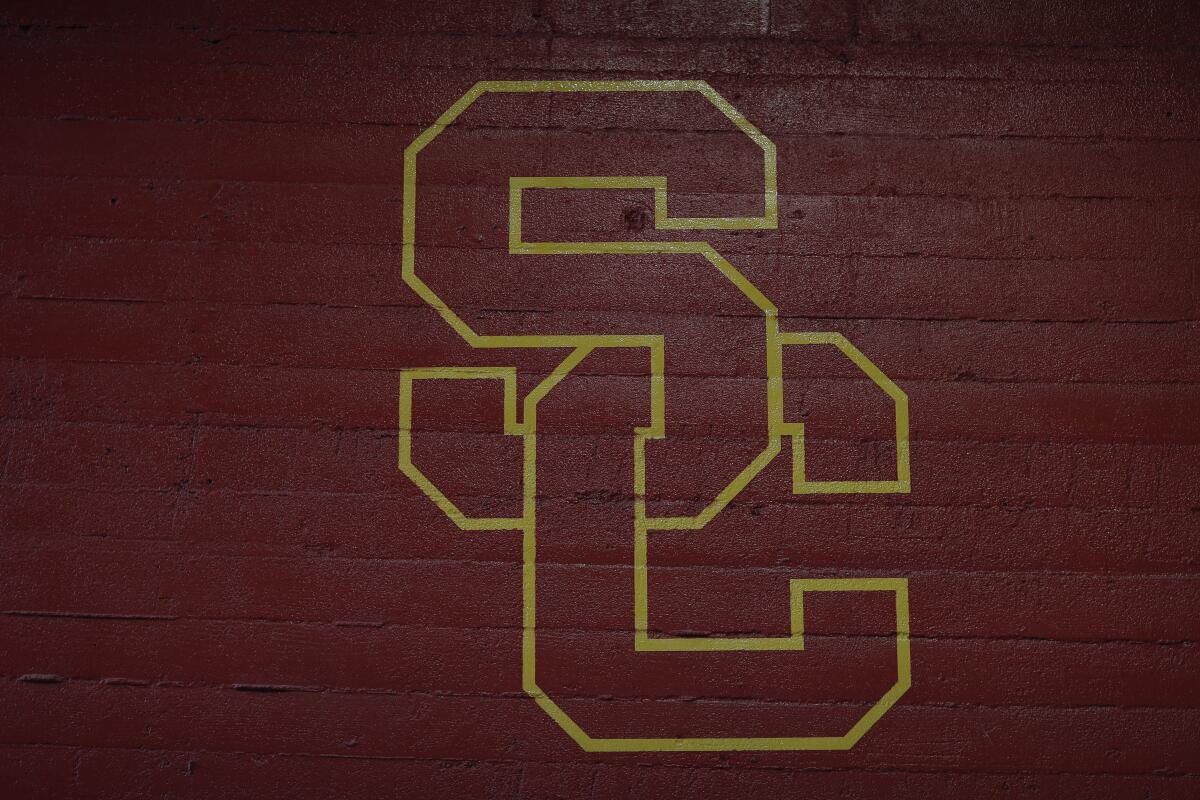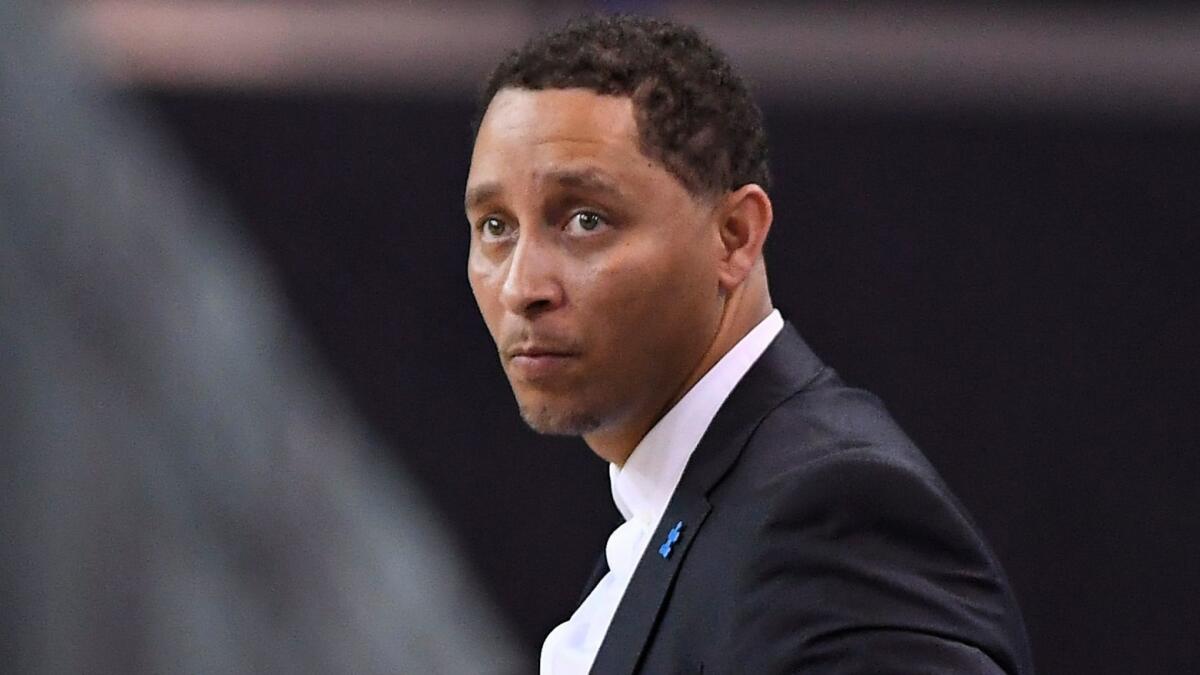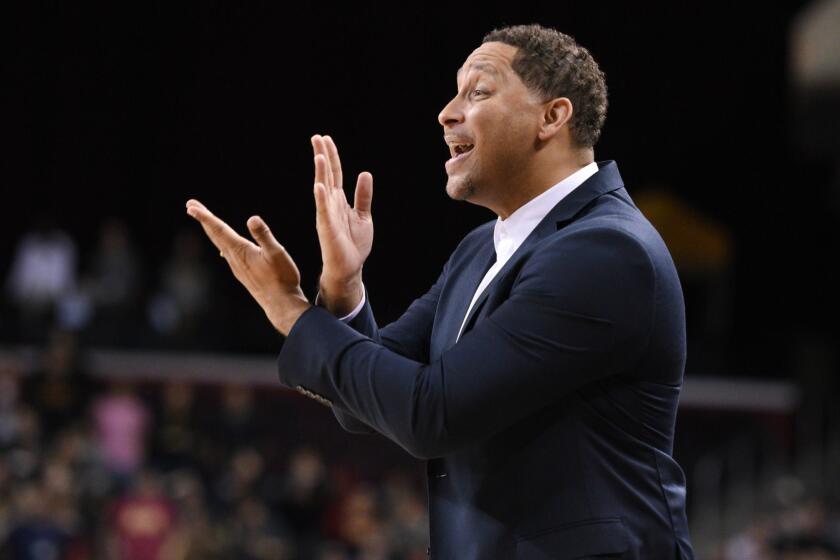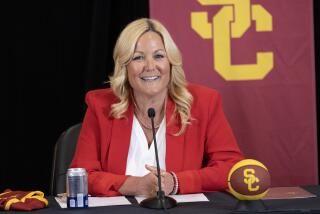USC basketball avoids major NCAA penalties in corruption case

- Share via
During an early-morning raid three and a half years ago, gun-wielding FBI agents arrested Tony Bland, then the associate head men’s basketball coach at USC, in a hotel room as part of the sprawling investigation into bribery and corruption in the sport.
The saga, which included undercover federal operatives and hidden cameras, finally ended for USC with an 11-paragraph news release from the NCAA on Thursday.
The organization’s infractions committee put the men’s basketball team on probation for two years — the school must develop and implement a rules education program for athletics department staffers during the period — in addition to accepting the self-imposed reduction of two scholarships during the 2018-19 season and significant cuts in the number of recruiting visits.
Former USC associate head coach Tony Bland “caused significant harm to USC and its student-athletes” in connection with the federal probe into college basketball corruption, according to a letter from a senior school official filed in U.S.
“This was a comprehensive process and we are looking forward to moving on,” USC head coach Andy Enfield said in a statement.
USC avoided program-altering punishment, as the committee cited the school’s “exemplary cooperation” and “meaningful penalties” it imposed.
“The associate head coach demonstrated a recurring lack of judgement that resulted in unethical conduct and representation violations for both himself and USC,” the committee said. “Despite [Bland’s] underlying violations, he met his obligation when he participated in the NCAA investigation and provided information relevant to the investigation.”
Bland received a three-year show cause penalty, meaning “any NCAA member school employing him must restrict him from any athletically related duties unless it shows cause why the restrictions should not apply.”
The future of the penalty in the state is murky. In a lawsuit by former USC running backs coach Todd McNair against the NCAA, Los Angeles County Superior Court Judge Frederick Shaller ruled in October 2018 that the show-cause penalty violated state law as an “unlawful restraint on engaging in a lawful profession.” The order, however, hasn’t been entered as a judgment as McNair’s case continues.
Bland didn’t respond to a message seeking comment. He was one of four prominent college assistant coaches arrested by the FBI in the corruption probe that shook the college basketball, joining Arizona’s Book Richardson, Auburn’s Chuck Person and Oklahoma State’s Lamont Evans. All were terminated by their schools and eventually accepted plea bargains. Would-be sports management executive Christian Dawkins, former Adidas employee Jim Gatto and another ex-Adidas employee, Merl Code, were convicted at trial, while others agreed to cooperate with prosecutors.

In January 2019, Bland pleaded guilty in U.S. District Court in Manhattan to one felony count of conspiracy to commit bribery. Before Bland’s sentencing, USC said in a victim impact statement that Bland’s actions “significantly damaged the reputation of USC as an institution, the USC athletic department, and its men’s basketball program.”
Judge Edgardo Ramos sentenced Bland to two years’ probation and 100 hours of community service, far short of the six to 12 months in prison requested by prosecutors.
“I was praying for the best and hoping for leniency,” Bland said at the time. “I’m just happy to have another opportunity at developing as a person and to move on with my life.”
Prosecutors initially accused Bland of receiving a $13,000 in bribe in connection with then-USC player De’Anthony Melton and top recruit Taeshon Cherry. Melton, now with the Memphis Grizzlies, didn’t play another game for USC, and Cherry instead went to Arizona State. Neither player was accused of wrongdoing by authorities.
But Bland admitted to accepting a $4,100 bribe to direct USC players to retain a sports management company fronted by Dawkins when they turned professional.
The money changed hands when Bland met Dawkins and two other men — one of them as an undercover FBI agent posing as an investor in the sports management company — in a Las Vegas hotel suite in July 2017. An undercover camera captured Bland boasting about his sway over USC players.
The sound of heavy footsteps in a hallway woke Tony Bland early on a September morning in 2017.
“You know … I have some guys that I can bring in that I can just say, ‘This is what you’re [expletive] doing,” he said in the recording. “And there’s other guys who we’ll have to work a little harder for, but we’ll still have a heavy influence on what they do.”
The undercover FBI agent gave Dawkins the $13,000, but bank records introduced in court showed he deposited almost $9,000 at an ATM the next day. Several people with direct knowledge of the matter told The Times that Bland got much less than the $4,100 he admitted to because Dawkins spent an additional $2,000 of the total at a Gucci store.
Dawkins testified that he gave Bland “between a thousand and two thousand dollars” of the money to spend at a bachelor party.
USC placed Bland, the team’s top assistant, on administrative leave following the arrest, then fired him in January 2018.
The Trojans are the fourth school to be punished by the NCAA in connection with the scandal, following heavier sanctions against Oklahoma State, South Carolina and Alabama. All received multiple years of probation and Oklahoma State was banned from the postseason for one year. Several other schools, including Arizona, have received a notice of allegations.
Vincent Nicastro, the committee’s chief hearing officer, praised USC’s approach to the case: “It really aided us in our ability to make a more informed decision.”
More to Read
Go beyond the scoreboard
Get the latest on L.A.'s teams in the daily Sports Report newsletter.
You may occasionally receive promotional content from the Los Angeles Times.








